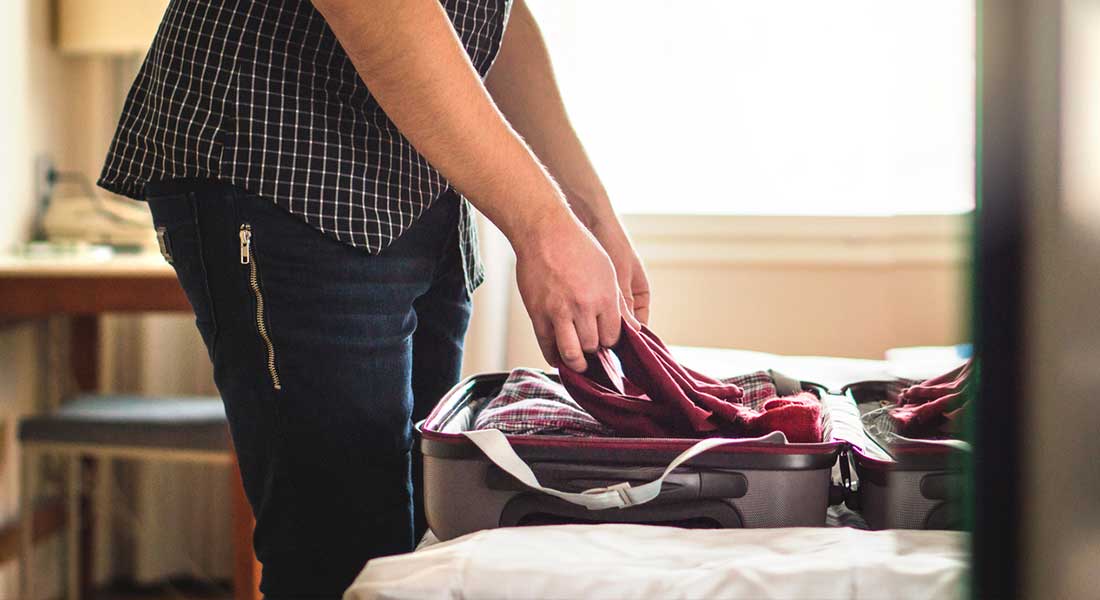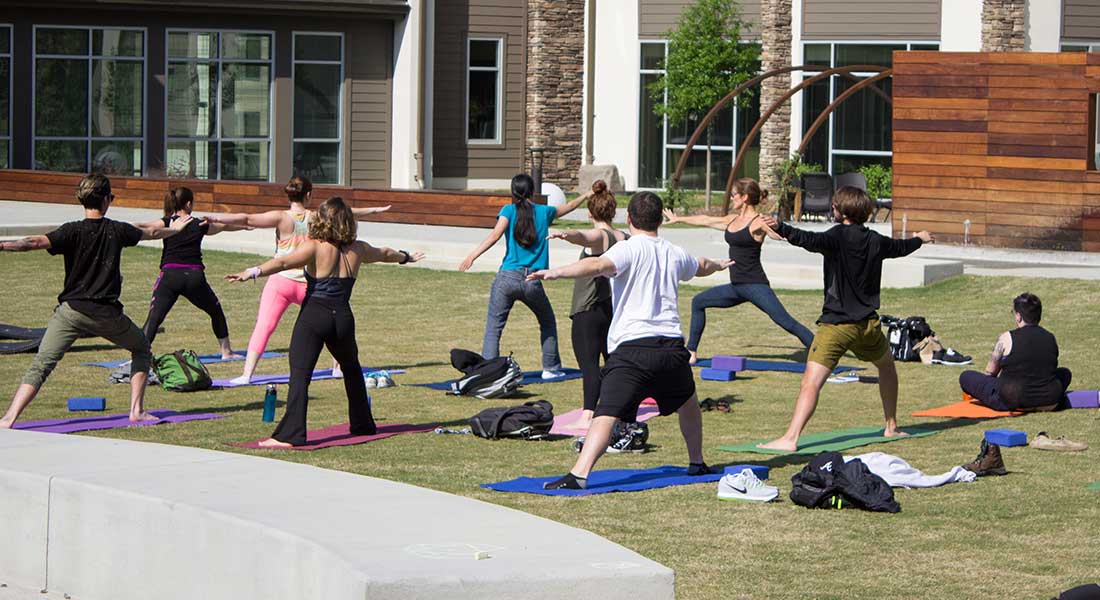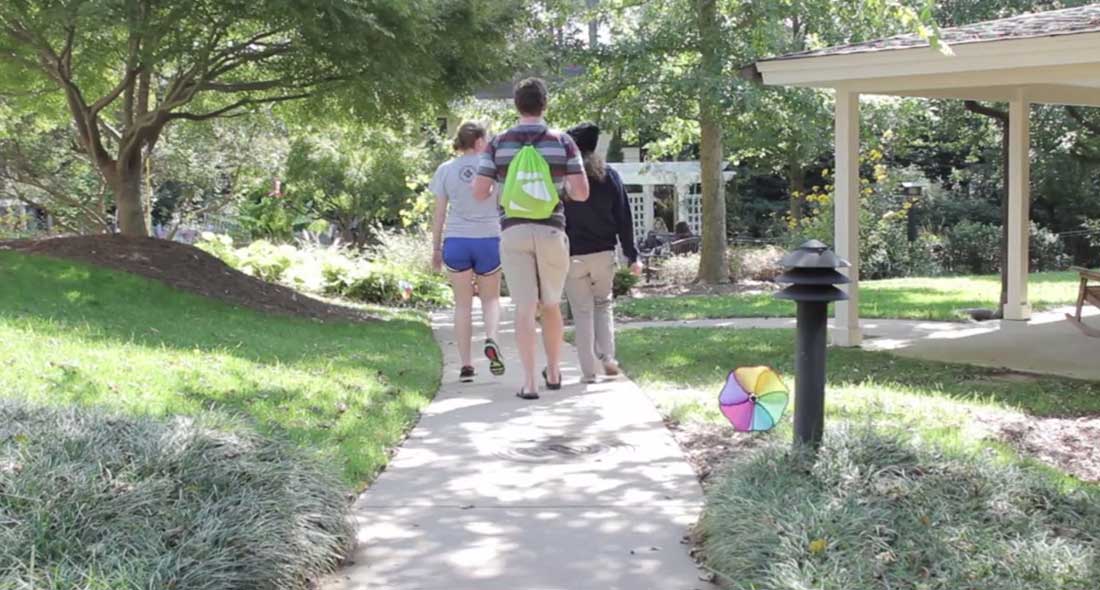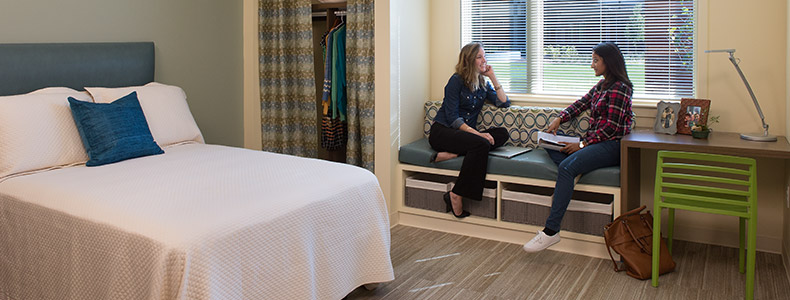What to Bring to the Adult Residential Program
Below is a general list of items to bring and to leave at home. If there are items not included on the list that your loved one wants to bring, ask the admissions staff or primary counselor.
For staff safety: Please limit your luggage to no more than 40 pounds per bag. Keep in mind that storage space is limited to one closet for each client. Please limit personal items to those that can be stored in a bedroom (with one dresser and one desk).
For client safety: To ensure client safety, residential staff may require that some items be kept at the nurses station and checked out when in use. Some items, like razors and hair dryers, are listed below. The residential team may identify additional items when the client arrives at the residence.

Medications
Please bring the entire supply of prescribed medications you currently have on hand to your admissions appointment. At minimum, residential clients must bring a 7-day supply of each prescribed medication with them to the admission appointment. All medications must be in their original bottles or packaging. After the admissions appointment, all client medications will be kept in the locked medication room in the staff office. Any medications that are discontinued will be destroyed.
Personal Toiletries
Each client is responsible for providing personal hygiene products such as shampoo, toothpaste and deodorant. Once clients reach Level 1 (usually after about 3 days) they are able to go on weekly trips to Target, etc. Some personal toiletry items, like sharps (e.g. razors, tweezers, scissors, etc.), toiletries in glass containers (e.g. perfume, nail polish, facial creams, etc.), and products containing alcohol (e.g. mouthwash, hand sanitizer, etc.) will be kept at the nurses station, and the client may check them out when needed. Please do not bring flushable wipes (they are not compatible with our sewer system). Because storage space at the nurses station is limited, please limit these items - sharps, glass containers, and products containing alcohol - to what will fit in a one gallon plastic storage bag. When possible, consider transferring some items in glass containers to plastic containers.
Face Masks
Masks are required while indoors in any space occupied by more than one person. Masks must be procedure or surgical masks and be worn correctly to cover the nose and mouth. N95 or KN95 masks may be worn but are not required. Cloth masks may be worn over a procedure mask if you choose, but cloth masks may not be worn alone.

Comfortable Clothing
Clients are encouraged to pack and wear comfortable clothing. A 7 to 10 day supply of clothing is recommended. Be prepared to get a little dirty sometimes. You will work with paint, clay and other materials in art therapy, food in our cooking classes and natural materials outdoors in our greenhouse and gardens. You also should pack clothes and shoes appropriate to wear while using our exercise room and gym.
We provide washers, dryers and detergent for residential client use. Clients are responsible for washing their own clothes, linens and towels. Laundry baskets, an iron and an ironing board are provided.
Clothing should be appropriate and should cover the chest, torso, buttocks, and undergarments. Shoes and supportive undergarments (bras, underwear, boxers, etc.) must be worn at all times outside of client private rooms.
Clothing items that are specifically prohibited include, but are not limited to:
- clothing with offensive language or that promotes or depicts drugs, alcohol, tobacco, drug paraphernalia, violence, or hate speech
- tops that expose the midriff or torso including halter tops or shirts with open sides
- tops that expose undergarments
- low cut or open tops that expose the chest (male and female)
- pants, shorts or skirts that expose undergarments or buttocks
- sheer or see-through clothing
- pajamas or nightclothes outside of private client rooms
Skyland Trail staff may ask a client to adjust his or her attire if a particular item or style of dress conflicts with treatment goals and activities.
Clients should dress comfortably and should wear clothing suitable for the day’s treatment activities (i.e. active wear for exercising, clothing you don’t mind getting dirty for horticultural or art therapy, etc.) Temperatures vary in different environments, so sweaters, sweatshirts or light jackets may help you feel more comfortable. We have a large campus, and you may do more walking than usual from building to building, so please wear comfortable shoes.
A Backpack or Tote
Clients will be moving between facilities throughout the day without access to the residences between groups. A backpack, messenger bag, or tote will be helpful to carry the materials you need for groups along with a water bottle or other items needed during the day.

Water Bottle
Stay hydrated! Bring a small water bottle to carry with you.
Umbrella
Bring a small collapsible umbrella that will fit in your backpack or tote bag.
Wrist Watch
You will need a way to keep track of time and follow your treatment schedule without your phone. Consider bringing an inexpensive wrist watch for easy time management.
Phones, Tablets, and Devices
When clients admit to residential treatment, they must check in all smart phones,
smart watches, tablets, laptops, and all other devices. The residential level system
outlines expectations and privileges as clients move through treatment. Clients receive
their smart phones, smart watches, and ipods when they reach level 2. (Residential
clients are eligible for level 2 after two weeks.) They receive their tablets, laptops,
kindles, and handheld gaming systems at level 3.
Desktop computers and gaming systems that require a TV or monitor (e.g. Xbox or
playstation) are not permitted at any level.
Client access to devices may be limited if it interferes with treatment participation.
Personal Electronics
Because you will not have access to your phone until level 2, consider key functions for which you typical rely on your phone. For example, if you use your phone as a wake-up alarm, you might need an alarm clock. If you use your phone for white noise for sleeping, you might need a noise machine. Please note restrictions about cords below.
Battery-powered alarm clocks and electronics are preferred. Electronics with cords longer than 3 feet (e.g. hair dryers, curling irons, etc.) may be kept at the nurses station and checked out by the client when needed. Because storage space at the nurses station is limited, please bring no more than three items with cords longer than 3 feet. Outside a client's bedroom, headphones must be used. TVs are not permitted in client rooms. TVs with cable are available in community dayrooms.
Books, Magazines, or Puzzles
Because you will not have access to your phone until level 2, consider other activities for personal unstructured time before bed or on weekends. Consider bringing a book, magazines, word puzzles, and/or a journal.

Decorative Items for Room
Clients are encouraged to bring small personal items and mementos for the room. (Note that nothing can be nailed to the wall.) Photo frames should not contain glass.
About Musical Instruments & Art Supplies
We celebrate the musical and artistic talents of our clients and encourage clients to incorporate music and art as part of their strategy to maintain health. However, because our residences are shared living spaces and our client rooms have limited storage capacity, we ask clients to adhere to a few rules. Clients are limited to one instrument. Drum sets must be table-top size. Headphones must be used with electric guitars, keyboards, etc. Instruments should not be played in common areas outside of the client's private room. The music room in the activity center is open during specific hours for clients to use freely. Clients may bring coloring books, crayons, pencils and markers. Please do not bring paints or canvasses. Clients will have access to the art room and a wide range of art materials from paints to ceramics during art therapy groups and during some evening hours.
Insurance Cards
Please be sure the client has copies of all health insurance cards, including cards for dental or vision plans. Clients may require specialized or preventive care with healthcare providers in the community. The treatment team may assist with scheduling these appointments and arranging transportation. Access to these insurance cards is important to facilitate scheduling and billing.
What NOT to Bring
Furniture
Rooms are fully furnished, and there is little room for extra pieces.
Cash and Valuables
Small amounts of cash can be secured on their person (no more than $20 each week). If the client desires, we will help prepare a budget. Valuable jewelry, other items of value and large amounts of cash should not be brought to Skyland Trail.
Alcohol, Drugs
Clients are not allowed to have alcohol, street or non-prescription drugs in their possession or on Skyland Trail property.
Tobacco, Vaping, and Other Nicotine Products
Cigarettes and tobacco-related products found on campus will be confiscated and discarded. During the admission appointment e-cigarettes, vaping pens, and related materials will be confiscated and sent home with the client’s family or, if found after admission, mailed home to the client’s family.
OTC Medicines & Supplements
Please do not bring any over-the-counter medicines like ibuprofen or aspirin or any non-prescription supplements like vitamins or herbal or nutritional supplements. These medications are available as needed from the nurse’s station. If these supplements are brought to the residence, they will be destroyed because we cannot verify their origin or safety. If you have a prescription from your doctor for a supplement to treat a known medical problem, please present your prescription and the supplement to the nurse at admission. Your supplement will be available as needed at the nurses’ station.
Prohibited Products
Any products containing CBD, THC, hemp, Delta 8, kratom, or any other marijuana derivative are prohibited. Products may not have branding or imagery that depicts marijuana, tobacco, alcohol, or weapons or marijuana-, tobacco-, or alcohol-related items. Fireworks, sparklers, candles, incense, and other products that require the use of fire.
Weapons
Weapons of all types including firearms are strictly barred from Skyland Trail facilities and campuses. Weapons are not permitted anywhere on Skyland Trail property or in Skyland Trail vehicles.
Bed linens, towels and cleaning supplies
Skyland Trail provides soap, toilet paper, towels and sheets, laundry detergent and other cleaning supplies. Clients may choose to use their own bed linens if they prefer. Rollins Campus and South Campus beds are full size, and North beds are queen size.
Appliances
Space heaters, coffee makers, hot plates, microwaves, toaster ovens, and other kitchen or cooking appliances are not permitted.
Recreational Equipment
Bicycles, skateboards, scooters, roller blades, roller skates, and other similar items are not permitted on campus.
Pets
No pets are permitted on Skyland Trail campuses. A partnership with Happy Tails allows clients to interact with animals periodically through our LEAP program.
About Cars
Vehicles are allowed at Skyland Trail South and Rollins only at Level 4. Please see the Residential Level System for restrictions about passengers. Talk to your admissions counselor about when it might be appropriate to bring a client's car to campus.
About Food and Snacks
Clients may have small quantities of nonperishable snack food in their rooms as long as room cleanliness expectations are met. Food must be stored in airtight containers (e.g. plastic containers with snapping lids, or Ziploc bags). If food concerns develop related to room cleanliness or health of the client, the treatment team may prohibit a client from keeping food in his or her room. Any products containing CBD, Delta 8, or kratom are prohibited.
